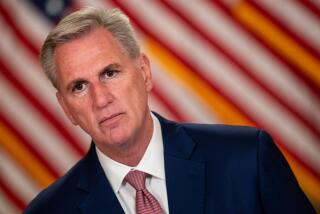Short-Term Economic Stimulus Plan Has Wide Support, Clinton Aide Says : Transition: The President-elect’s spokesman says lawmakers back program that could delay a reduction in the deficit.
LITTLE ROCK, Ark. — A top aide to Bill Clinton proclaimed Friday that the President-elect had found broad support in Washington for a short-term program to stimulate the economy, but they skirted the politically awkward question of whether he would endorse an initial increase in the federal budget deficit.
As Clinton returned to Arkansas after meetings with congressional leaders, his chief spokesman said the President-elect had encountered remarkable unanimity in favor of a program that would combine short-term stimulative measures with longer-term deficit reduction.
“We had across-the-board consensus on that kind of approach,” communications director George Stephanopoulos said. He described Clinton as encouraged and gratified by the bipartisan support.
Stephanopoulos acknowledged that the leaders had not discussed details of any such measures and said specifics of the Clinton program are far from being decided.
Economic stimulus would seem likely to include some combination of tax cuts and spending increases, both of which run counter to efforts to narrow the deficit. But Stephanopoulos declined to say if Clinton’s first-year plan would widen the gap.
The silence appeared in some part to reflect the indecision of Clinton’s eclectic team of economic advisers. But after a day of good feeling on Capitol Hill, the caution also underscored Clinton’s hope of postponing public debate about the importance of deficit reduction.
Clinton has pledged to reduce the annual federal deficit by half in his first four years in office. But he and some advisers have also suggested that the sluggish economy is in such need of stimulus that deficit reduction should be postponed during his Administration’s first year.
At the same time, the Clinton team also appears to recognize the degree to which the candidacy of independent Ross Perot heightened public consciousness about the gap between federal spending and revenues.
And Sen. Phil Gramm (R-Tex.) and other Republicans have begun to serve notice of their willingness to fight any economic stimulus program they believe shows insufficient budget discipline.
At a briefing Friday at Clinton’s Little Rock press headquarters, Stephanopoulos said “the important thing is that we have a long-term deficit reduction program in place.” But he said he still could not rule out the prospect that Clinton’s first-year stimulus plan would bring about an initial widening of the budget gap.
“I just can’t say yet whether or not there would be any increase--short-term increase--in the deficit made up in the long term,” he said. “We know that there has to be some stimulus followed by deficit reduction.”
The question of how much stimulus the economy may need early next year has been debated in the Clinton camp since before the election, although advisers first denied that they were considering postponing the deficit reduction program.
Among the most active proponents of putting immediate emphasis on short-term stimulus were Occidental College professor Derek Shearer and economic consultant Ira Magaziner, both friends of Clinton. Harvard University professor Robert B. Reich, now the head of Clinton’s economic team, is said to be acting as a moderator between that wing and other advisers more concerned about the size of the deficit.
On Friday, as new government statistics showed a decline in new housing construction and an increase in unemployment claims, Stephanopoulos said Clinton remained concerned by the nation’s long-term economic problems.
But he added that Clinton would wait until early next year to decide how much the economy remained in need of an immediate stimulus. And he suggested that the incoming President might well give prominence to a modest job-creation program that would simply accelerate current spending.
The most important such measure would speed up outlays for highways, roads and bridges, Stephanopoulos indicated. If Clinton chooses a cautious economic stimulus program, another component is likely to be an investment tax credit, which the incoming President’s team contends would not add to the deficit.
As the Clinton team continued to place top priority on economic issues, Warren Christopher, the director of his transition team, was said to have telephoned Sen. Lloyd Bentsen (D-Tex.) to ask whether he would be interested in becoming Treasury secretary.
Bentsen, who reported receiving the call, said he told Christopher he was not seeking a post and was “happy where I am.”
More to Read
Get the L.A. Times Politics newsletter
Deeply reported insights into legislation, politics and policy from Sacramento, Washington and beyond. In your inbox three times per week.
You may occasionally receive promotional content from the Los Angeles Times.










